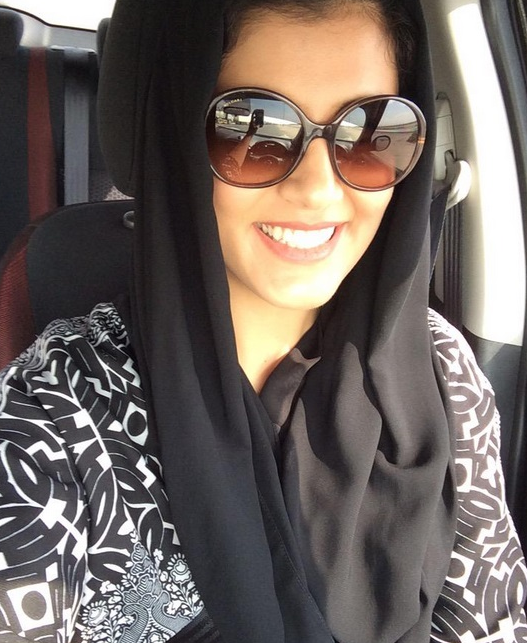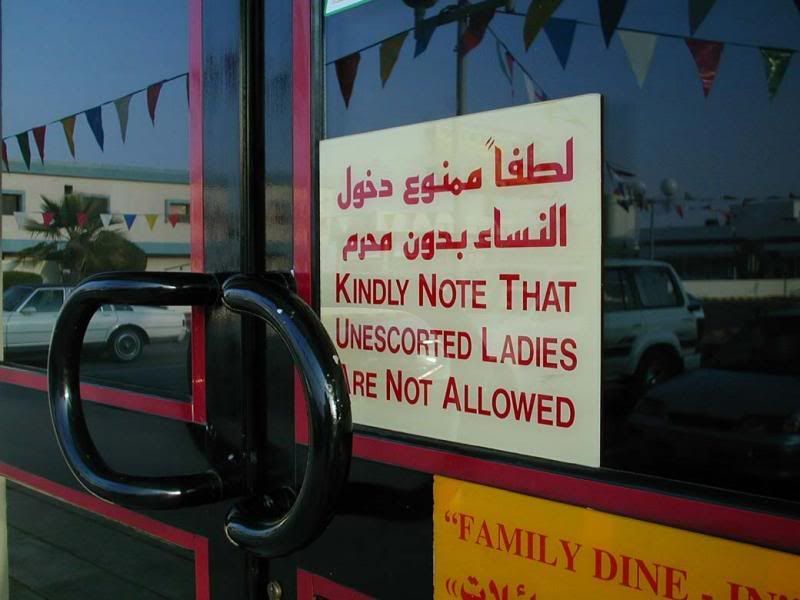Faceless Women of Saudi Arabia
By: Shirlee Finn
A few days ago I received a newsletter from MEMRI, a site everyone should subscribe to. The newsletter was
 about
a TV programme in Saudi Arabia concerning Saudi women and driving.
Truly mind boggling how the minds of Saudi men work. The sheer
ignorance is not believable.
about
a TV programme in Saudi Arabia concerning Saudi women and driving.
Truly mind boggling how the minds of Saudi men work. The sheer
ignorance is not believable.It’s worse than the ‘dark ages’ when civil authorities burnt people ‘ at the stake’ judged to be heretics under the medieval Inquisition. Burning heretics was a customary practice in the latter half of the twelfth century in continental Europe.
During a TV show on the January 11, Saudi historian Saleh Al-Saadoon said that women should not be allowed to drive on the grounds that they might be raped if their car broke down on the roadside!
Saleh Al-Saadoon:
“Women used to ride camels, so one might ask what prevents them from driving cars. In Saudi Arabia, we have special circumstances. The city of Arar is 150 km away from Al-Jawf. If a woman drives from one city to another and her car breaks down, what will become of her?”
Interviewer:
“Well, women drive in America, in Europe, and in the Arab world…”
Saleh Al-Saadoon:
“They don’t care if they are raped on the roadside, but we do…”
Interviewer:
“Hold on, who told you that they don’t care about getting raped by the roadside?”
Saleh Al-Saadoon:
“It’s no big deal for them beyond the damage to their morale. In our case, however, the problem if of a social and religious nature.”
We hear little of women’s’ rights campaigners helping but according to the Daily Mail on Dec. 27.2014…
“Women’s rights campaigners who tried to drive into Saudi Arabia are to be sent to special ‘terrorism’ tribunal.”
His comments reflect the extent of opposition to women driving among some conservatives in Saudi Arabia.
“If a woman drives a car, not out of pure necessity, that could have negative physiological impacts as functional and physiological medical studies show that it automatically affects the ovaries and pushes the pelvis upwards,” he told Sabq.
“That is why we find those who regularly drive have children with clinical problems of varying degrees.”
He did not cite specific medical studies to support his arguments. Probably because there aren’t any !
As I was ready to post this article the following came in a news feed from the International Business News ..co-incidental!
Saudi Arabia frees two women after 73 days in jail for driving

Loujain al-Hathloul and Maysaa al-Amoudi were arrested last December and spent 73 days in prison.
Hathloul was arrested shortly after she documented her attempt to defy the ban, claiming that her driving licence, from the United Arab Emirates, could also be used in Saudi Arabia.
Al-Amoudi entered Saudi Arabia by car from the UAE shortly after the arrest, to support Hathloul by delivering food, water and a blanket. She was then arrested too.
Saudi Arabia is the only country in the world where women are not allowed to drive.
The two activists were investigated without being allowed to see a lawyer, which is a violation of Saudi law, Amnesty warned.
It is not yet clear whether the charges have been dropped.

- sex segregation, justified under the Sharia legal notion of ‘shielding from corruption’ , and
- women’s alleged `lack of capacity` which is the basis of the necessity of a male guardian whose permission must be granted for travel, medical procedures, obtaining permits, etc.
- marriage and divorce;
- travel, if under 45;
- education;
- employment;
- opening a bank account;
- elective surgery, particularly when sexual in nature.
 In
2012 the Saudi Arabian government introduced a new policy to help with
the enforcement on the travelling restrictions for women.
In
2012 the Saudi Arabian government introduced a new policy to help with
the enforcement on the travelling restrictions for women.“it’s the same kind of feeling they have for handicapped people or for animals. The kindness comes from pity, from lack of respect.”
She compares male guardianship to slavery:
The ownership of a woman is passed from one man to another. Ownership of the woman is passed from the father or the brother to another man, the husband. The woman is merely a piece of merchandise, which is passed over to someone else—her guardian … Ultimately, I think women are greatly feared. When I compare the Saudi man with other Arab men, I can say that the Saudi is the only man who could not compete with the woman. He could not compete, so what did he do with her? … The woman has capabilities. When women study, they compete with the men for jobs. All jobs are open to men. 90% of them are open to men. You do not feel any competition … If you do not face competition from the Saudi woman … you have the entire scene for yourself. All positions and jobs are reserved for you. Therefore, you are a spoiled and self-indulged man.
The absurdity of the guardianship system, according to Huwaider, is shown by what would happen if she tried to remarry:
“I would have to get the permission of my son.”

If women are in the company of unmarried men they must cover the parts of the body that aren’t meant to be exposed. In much of Islam this is not an issue and a women’s face can be exposed. In Saudi Arabia and some other Arab states, all of the body apart from the hands and eyes must be covered, so women are expected to wear the hijab (head covering), a full black cloak called an abaya, and a face-veil called niqab.
I can’t begin to imagine how hot it must be wearing that.
Seems that what you wear is more important than your life.
In 2002 a fire at a girls’ school in Mecca in Saudi Arabia killed fifteen young girls, with more than 50 injured. Nine of the dead girls were Saudis; the rest were from Chad, Egypt, Guinea, Niger and Nigeria.
“Women and girls may have died unnecessarily because of extreme interpretations of the Islamic dress code.”
According to at least two reports, members of the ‘Committee for the Propagation of Virtue and the Prevention of Vice’ or modesty police, which are also known as mutaween, would not allow the girls to escape or to be saved from the fire because they were “not properly covered”, and they did not want physical contact to take place between the girls and the civil defense forces for fear of sexual enticement, and that the girls were locked in by the police, or forced back into the building. Human Rights Watch quoted a Civil Defense officer as saying,
“Whenever the girls got out through the main gate, these people forced them to return via another. Instead of extending a helping hand for the rescue work, they were using their hands to beat us.”
The CPVPV denied the charges of beating or locking the gates but the incident and the accounts of witnesses
 were reported in Saudi newspapers such as the Saudi Gazette and Al-Iqtisaddiyya. The result was a very rare public criticism of the group.
were reported in Saudi newspapers such as the Saudi Gazette and Al-Iqtisaddiyya. The result was a very rare public criticism of the group.Sexual segregation which keeps wives, sisters and daughters from contact with stranger men, follows from the extreme concern for female purity and family honour. Social events are largely separated ; the mixing of non-kin men and women at parties is extremely rare and limited to some of the more modern Western-educated families.
Women who are seen socialising with a man who is not a relative, can be harassed by the Islamic religious police and even charged with committing adultery or prostitution.
Saudi homes go to the extreme of having one entrance for men and another for women. For non-related males to enter the female sections of a Saudi home is a violation of family honour. Private space is associated with women while the public space, such as the living room, is reserved for men. Traditional house designs also use high walls, sectioned rooms, and curtains to protect the family and particularly women from the public.

Companies are expected to create all-female areas if they hire women. Public transport is segregated. Public places such as beaches and amusement parks are also segregated, sometimes by time, so that men and women attend at different hours.
Segregation is particularly strict in restaurants, since eating requires removal of the veil. Most restaurants in Saudi Arabia have “family” and “bachelor” sections, the latter for unmarried men or men without a family to accompany. Women or men with their families have to sit in the family section. In the families section, diners are usually seated in separate rooms or behind screens and curtains. Waiters are expected to give time for women to cover up before entering. Restaurants women who come without their husbands or escort. If they are allowed in, it will be to the family section.
Women cannot be waitresses except at a few women-only restaurants.

Men and women may, sometimes, mix in restaurants of Western luxury hotels that cater primarily to non-citizens.
In recent years, the Labor Ministry has banned the employment of men or non-Saudi women in lingerie and other stores where women’s garments and perfumes are sold. In 2005 the Ministry announced a policy of staffing lingerie shops with women as many Saudi women also disliked discussing the subject of their undergarments with men.
The few shops which employed women were “quickly closed by the religious police” so women boycotted lingerie shops, and in June 2011 King Abdullah issued another decree giving lingerie shops one year to replace men workers with women.
This was followed by similar decrees for shops and shop departments specializing in other products for women, such as cosmetics, abayas and wedding dresses.
It seems quite unbelievable that in this day and age there are people with such a primitive way of thinking.
This article was reposted with permission from Jews Down Under.
Related Reading:
The Treatment of Women in Islam
The Effect of Muslim Appeasement on Women
No Love for Valentine’s Day in Islam
Religious Sensitivity for the Most Insensitive Religion Around
The Treatment of Religious Minorities in Muslim Lands






































No comments:
Post a Comment